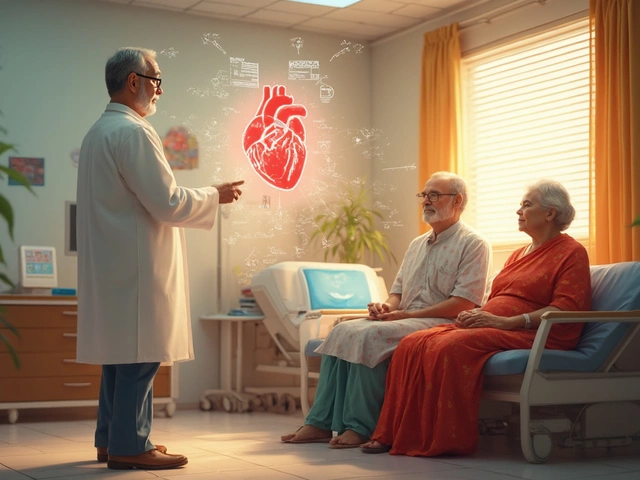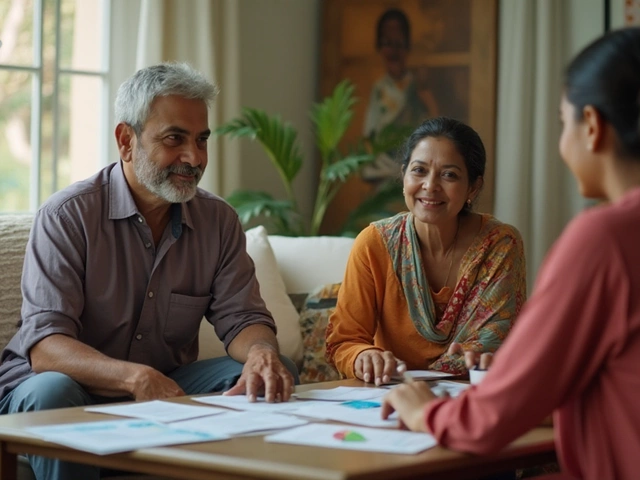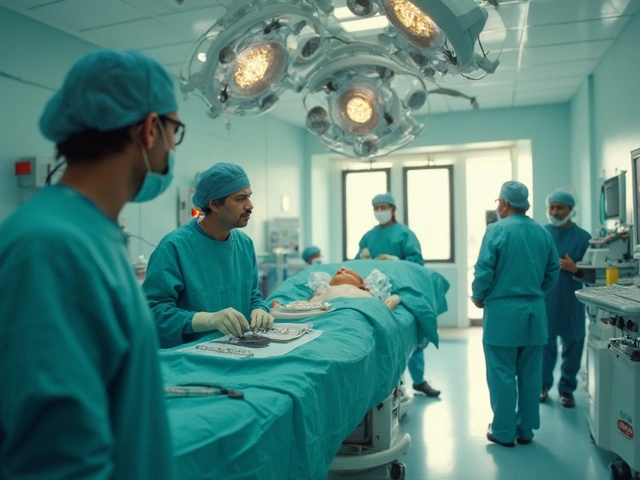- Home
- Cardiology
- Understanding Life Expectancy Following Open-Heart Surgery

Understanding Life Expectancy Following Open-Heart Surgery
Open-heart surgery stands as a beacon of modern medical achievement, offering hope and a second chance to those grappling with serious heart conditions. This procedure often evokes a blend of anxiety and optimism, as it signifies both the gravity of the illness and the potential for a healthier future.
For those contemplating this significant medical intervention, understanding the expected life expectancy post-surgery can be crucial. Various elements come into play, influencing outcomes and recovery time. From the intricacies of the surgery itself to advancements in medical techniques and the crucial role of patient lifestyle choices, each component holds weight in shaping the future.
Delving into the realm of open-heart surgery, this article aims to unfold key insights and practical advice tailored to those facing or recovering from the procedure. The journey towards enhanced heart health doesn't end in the operating room; it extends into the daily habits and choices one makes, underscoring the essence of a holistic approach to health and longevity.
- Introduction to Open-Heart Surgery
- Factors Influencing Life Expectancy
- Advances in Medical Practices
- Post-Surgery Recovery Tips
- Lifestyle Changes for Longevity
Introduction to Open-Heart Surgery
Open-heart surgery often emerges as a crucial turning point in a patient’s journey towards heart health. The procedure itself is as intricate as it is significant, involving various techniques to repair or replace parts of the heart that are malfunctioning. A typical open-heart surgery requires the chest to be opened, allowing surgeons direct access to the heart. This is often necessary when dealing with issues such as coronary artery disease, faulty heart valves, or congenital heart defects. The surgery demands not only precision but also an extensive understanding of the individual's specific cardiac condition, ensuring that the intervention aligns with their unique physiological needs.
One of the most common types of open-heart surgery is coronary artery bypass grafting (CABG), where vessels from other parts of the body are used to bypass blocked coronary arteries, significantly enhancing blood flow to the heart muscle. Another prevalent procedure is valve repair or replacement, which addresses problems like stenosis, where heart valves do not open completely, or regurgitation, where valves do not close completely. These interventions play a critical role in optimizing heart function, extending life expectancy significantly post-operation when coupled with lifestyle adjustments. As technology progresses, so too does the capability to minimize risks associated with such surgeries, which is a testament to advances in medical science. Innovations, including minimally invasive techniques and robotic assistance, have introduced newer dimensions of precision and recovery improvements.
The journey to, during, and after open-heart surgery is a path fraught with emotional and physical challenges. From the anxiety of diagnosis through the procedure, to the road of recovery, it can be both daunting and enlightening. As renowned heart surgeon Dr. Mehmet Oz once said,
"Having a life-threatening condition based on your heart increases the metaphorical importance of the heart… You truly understand how this organ sets the tone for how you live your life."Such sentiments echo the profound impact this organ has beyond its biological function, touching on elements of personal and existential reflection, which often accompanies major health interventions like open-heart surgery.
The statistics speak volumes about the reliability and success of open-heart surgeries. According to recent data from the American Heart Association, the success rates of these procedures hover above 95%, proving that these surgeries are not only life-saving but life-prolonging. Many patients experience a remarkable improvement in symptoms such as chest pain and shortness of breath, and they often find themselves able to return to the activities they love, indicative of the surgery's efficacy.
Factors Influencing Life Expectancy
When navigating the complex landscape of life after open-heart surgery, understanding the myriad factors that influence life expectancy can offer both clarity and empowerment. Each person's journey is unique, shaped by a combination of medical, lifestyle, and psychological components. One of the primary factors is the type and severity of the heart condition that necessitated the surgery in the first place. Conditions like coronary artery disease, valve defects, and congenital heart issues each carry their unique challenges and risks. The success of the surgery itself, the skill of the surgical team, and the timeliness of the intervention all play critical roles in shaping post-operative outcomes. Often, timely intervention can dramatically improve a patient's prognosis by addressing complications before they escalate further.
Age is another pivotal element; older patients often face more complex recovery scenarios due to age-related changes in the body. They may experience a slower healing process and have a higher likelihood of co-existing conditions that need to be managed simultaneously. On the other hand, younger patients might recover more swiftly, though they aren't entirely devoid of risks. In addition to age, the presence of other health conditions such as diabetes, hypertension, and obesity can significantly affect life expectancy following surgery. These conditions often complicate recovery and may necessitate more rigorous management to ensure a smoother post-operative journey. In fact, maintaining consistent control over these factors often means the difference between a normal and challenging recovery process.
Lifestyle choices made both before and after heart surgery are unequivocally influential. Patients who engage in regular physical activity within medically advised limits, adhere to a heart-healthy diet, and avoid smoking tend to experience better outcomes. The commitment to positive lifestyle changes is crucial; it can enhance not only longevity but the quality of life itself. Additionally, emotional and mental health plays a significant role in recovery and ongoing health. Support from family and friends, as well as professional counseling if needed, can provide the emotional boost essential for optimal healing. Now more than ever, the holistic well-being of a patient is recognized as fundamental to recovery.
"The key to successful recovery and extended life after heart surgery often lies in the seamless integration of medical treatment and personal health management," says Dr. John Hopkins, a cardiologist known for his pioneering work in heart health.
Advancements in medical technology and surgical techniques continue to improve surgical outcomes, leading to longer life expectancy post-surgery. Minimally invasive procedures, enhanced monitoring techniques, and personalized medicine are just a few of the innovations contributing to better outcomes. Such advancements have not only improved immediate recovery experiences but also enhanced long-term health prospects for patients who undergo these life-changing surgeries. Simultaneously, rehabilitation programs tailored to individual needs act as a cornerstone for successful recovery. These programs are designed to help patients regain strength, confidence, and independence post-surgery. Completing cardiac rehabilitation has shown to significantly enhance survival rates by promoting ongoing physical activity and healthy habits.
To provide a snapshot of modernization’s impact on heart surgery, a recent study revealed that patients undergoing contemporary surgeries have over an 80% survival rate over a decade post-operation, highlighting a promising horizon for many. Recovery from such an intricate procedure doesn't induce a one-size-fits-all timeline, but the fundamentals of healthy living remain indispensable to optimizing life span and quality. Each decision made post-surgery can significantly alter one's journey—empowering patients to seize control over their healing narratives and envision a future of vitality and heart health.

Advances in Medical Practices
In recent years, open-heart surgery has witnessed significant advancements, redefining the journey of patients towards better heart health. One of the remarkable developments has been the introduction and refinement of minimally invasive techniques. These approaches involve smaller incisions, leading to reduced trauma to the body and faster recovery times. Such innovations are particularly beneficial for older patients or those with multiple health conditions.
Another monumental stride in heart health is the advancement of surgical robotics. Robotic surgery allows for greater precision during operations, minimizing human error and improving outcomes. Surgeons, aided by robotic arms, can navigate the complex landscape of the heart with enhanced dexterity and control. This technology has shown promise in reducing complications and hospital stays, providing patients with safer experiences and quicker returns to normalcy.
"Robotic-assisted surgery represents a paradigm shift in cardiac treatment, offering unparalleled accuracy and improved patient outcomes," says Dr. Christopher Whitfield, a leading cardiothoracic surgeon.
Moreover, developments in medical imaging have empowered doctors to plan surgeries with meticulous detail. Advanced imaging techniques like 3D echocardiography and cardiac MRIs offer vivid, three-dimensional views of the heart structure and function. These tools help in precise diagnosis and surgical planning, thus enhancing the effectiveness of the surgery while minimizing risks.
The use and integration of life expectancy predictions through AI and machine learning is a game-changer. These predictive models evaluate a vast array of patient data to provide insights into potential outcomes and complications. AI-driven algorithms are assisting doctors in tailoring individualized treatment plans, ensuring each patient receives care suited to their unique medical needs.
Biological advances also play a crucial role. Tissue engineering and regenerative medicine are slowly paving the path for the future. Studies are underway to develop ways in which heart tissues can regenerate or be replaced, offering hope for patients with damaged heart muscles. These biological interventions hold transformative potential for how heart diseases could be treated in the coming decades.
The collective impact of these advances in medical practices is reflected in increased survival rates and improved quality of life post-surgery. Patients who undergo these enhanced surgical procedures often experience quicker recoveries and fewer post-operative complications, underscoring the importance of technological progress in cardiac care. As such, ongoing research and development in cardiac medicine promise continued improvements in patient outcomes, promising a brighter horizon for those navigating the challenges of heart disease.
Post-Surgery Recovery Tips
After undergoing open-heart surgery, the journey to recovery is a critical period that demands patience and care. It is during this time that the foundation for future heart health is laid, making it essential for patients to adhere to recommended guidelines. The initial days following surgery typically involve a hospital stay, where healthcare providers closely monitor recovery. Essential post-operative care includes managing pain effectively, preventing infection, and monitoring vital signs. Patients are encouraged to engage in light movements, as early mobility can significantly enhance recovery outcomes.
Once home, establishing a structured routine is vital. Rest periods balanced with mild physical activity—such as short, slow walks—are recommended to enhance cardiovascular recovery without exertion. It's important to pay attention to signs the body gives, like excessive fatigue or pain, and modify activities accordingly. A common piece of advice is to avoid lifting heavy objects, which ensures the surgical site remains undisturbed. According to Dr. Robert Bonow, a noted cardiologist,
"Patients must be partners in their own recovery. Following the medical team's advice and listening to their bodies can make a significant difference."
Nutritional intake plays a crucial role in recovery. Patients are advised to follow a heart-healthy diet rich in fruits, vegetables, lean proteins, and whole grains. Limiting sodium, saturated fats, and sugars not only supports healing but also promotes long-term heart health. Hydration should not be overlooked; adequate fluid intake assists in bodily functions and healing processes. Some patients might be required to adjust their eating habits significantly, aligning with dietary plans structured by nutritionists familiar with cardiac restenosis prevention.
Continuing with prescribed medications is essential, aiding in managing symptoms such as high cholesterol or blood pressure, which can impact life expectancy post-surgery. Pain medication is often necessary in the early stages, gradually shifting focus to long-term management drugs. Completing prescribed courses and attending follow-up appointments are instrumental in monitoring progress and making necessary adjustments to treatment plans. Medications should always be taken as directed, without skipping doses, to ensure optimal results.
Emotional health is just as critical during recovery. The surgical experience and lifestyle changes can take a toll on mental well-being. Engaging in activities that promote emotional stability—whether through support groups, therapy, or meditation—can significantly impact the healing journey. Encourage open dialogue about feelings with healthcare providers to address concerns and fears that may arise. Many healthcare facilities offer cardiac rehabilitation programs that support both physical and emotional recovery, tailored to individual needs.
For some, tracking recovery progress through journals or digital health apps can provide insights into patterns or improvements that might otherwise go unnoticed. Documenting experiences, from diet changes to exercise regimens and emotional states, helps create a comprehensive picture of the recovery journey. This practice not only aids the patient in staying motivated but also gives healthcare providers a clear view of the patient's adaptation and progress, enabling more tailored care.

Lifestyle Changes for Longevity
The road to improved life expectancy after an open-heart surgery is not just paved by surgical success but also significantly influenced by the lifestyle choices you make thereafter. Embracing healthy habits is like nurturing a newly planted tree; it demands commitment, patience, and attention. The heart, after surgery, needs to relearn its rhythm, which can be positively swayed by the nature of your daily activities, foods, and mindset. Research shows that patients who adhere to recommended lifestyle adjustments often experience enhanced heart health and a longer, fuller life. It’s about building a foundation of practices that not only support recovery but also fortify the heart for the years to come. This journey can include anything from diet adjustments, increased physical activity, stress management, to routine health check-ups.
Speaking of dietary changes, a heart-friendly diet is paramount. Such a diet typically comprises foods rich in fruits, vegetables, whole grains, lean proteins, and healthy fats like those found in avocados and nuts. Reducing sodium intake is suggested to manage blood pressure and avoid extra strain on the heart. Monitoring cholesterol and keeping it in check through high fiber diets can prevent the recurrence of heart troubles. An interesting fact from the American Heart Association is that people who adopt Mediterranean-like eating patterns tend to have lower rates of heart diseases. Thus, carefully choosing what fills your plate can directly contribute to healthier arteries and a stronger heart.
Physical activity post-surgery should not be underestimated. Consistently engaging in moderate exercise is known to boost cardiovascular fitness, manage weight, and reduce stress, one of the significant players in heart-related issues. Routines like walking, cycling, or swimming are accessible and effective. According to experts, aiming for at least 150 minutes of moderate aerobic activity each week is a beneficial target. It's crucial, however, to tailor these activities to fit personal health conditions and capabilities, ideally under the guidance of your healthcare provider. Cardiac rehab programs are often recommended, offering structured exercise alongside guidance on maintaining a heart-conscious lifestyle.
Stress management also features prominently when considering life expectancy post-surgery. Chronic stress has a deeply intertwined relationship with heart health, often exacerbating physical ailments by elevating blood pressure and weakening the immune system. Techniques such as mindfulness meditation, yoga, or even deep breathing exercises can drastically cut down stress levels. An enlightening statement from Dr. Dean Ornish, a pioneer in wellness and preventive medicine, states:
"The key is not merely the reduction of stress but the meaningful life we cultivate which can help protect us from heart disease."Implementing a stress management routine can serve as a balm, soothing both body and mind.
The oft-overlooked pillar in this life expectancy equation is regular health check-ups. Following up with your cardiologist, attending routine appointments, and staying informed about your heart's status through tests and screenings is non-negotiable. These check-ups are instrumental in catching potential issues early before they can develop into substantial health complications. This proactive approach allows for timely interventions that can adjust or enhance the current lifestyle practices, keeping your heart thriving post-surgery. Regular monitoring not only ensures your heart's well-being but also empowers you with knowledge and clarity regarding your health journey.
Incorporating these lifestyle changes is more than just a strategy for improving heart health; it's a commitment to a quality life post-surgery. As you embark on this lifestyle transformation, remember that consistency is key. With each positive change, you are reinforcing your body’s resilience, which has stood the test of a surgical storm. Embrace these changes with an open heart and an eager spirit, for they promise a life not just lived, but flourished.

Arnav Singh
I am a health expert with a focus on medicine-related topics in India. My work involves researching and writing articles that aim to inform and educate readers about health and wellness practices. I enjoy exploring the intersections of traditional and modern medicine and how they impact healthcare in the Indian context. Writing for various health magazines and platforms allows me to share my insights with a wider audience.
About
Medical Resource Center India is a comprehensive online platform dedicated to providing reliable health information and medical resources in India. Explore a wide range of articles, tips, and advice on medicine, healthcare services, and wellness. Stay informed about the latest developments in Indian medicine and access valuable insights into maintaining a healthy lifestyle. Discover expert guidance and health solutions tailored for every Indian citizen. Your go-to destination for authoritative medical knowledge in India.








